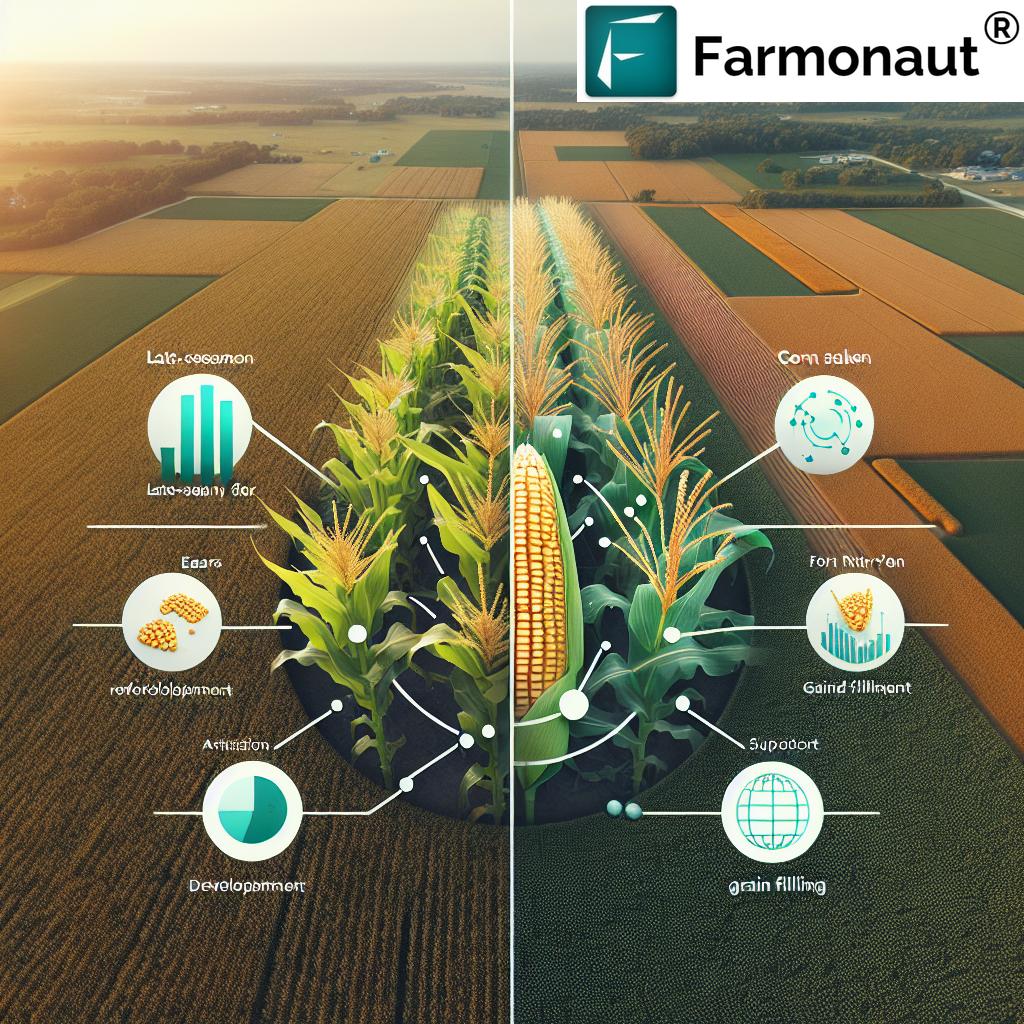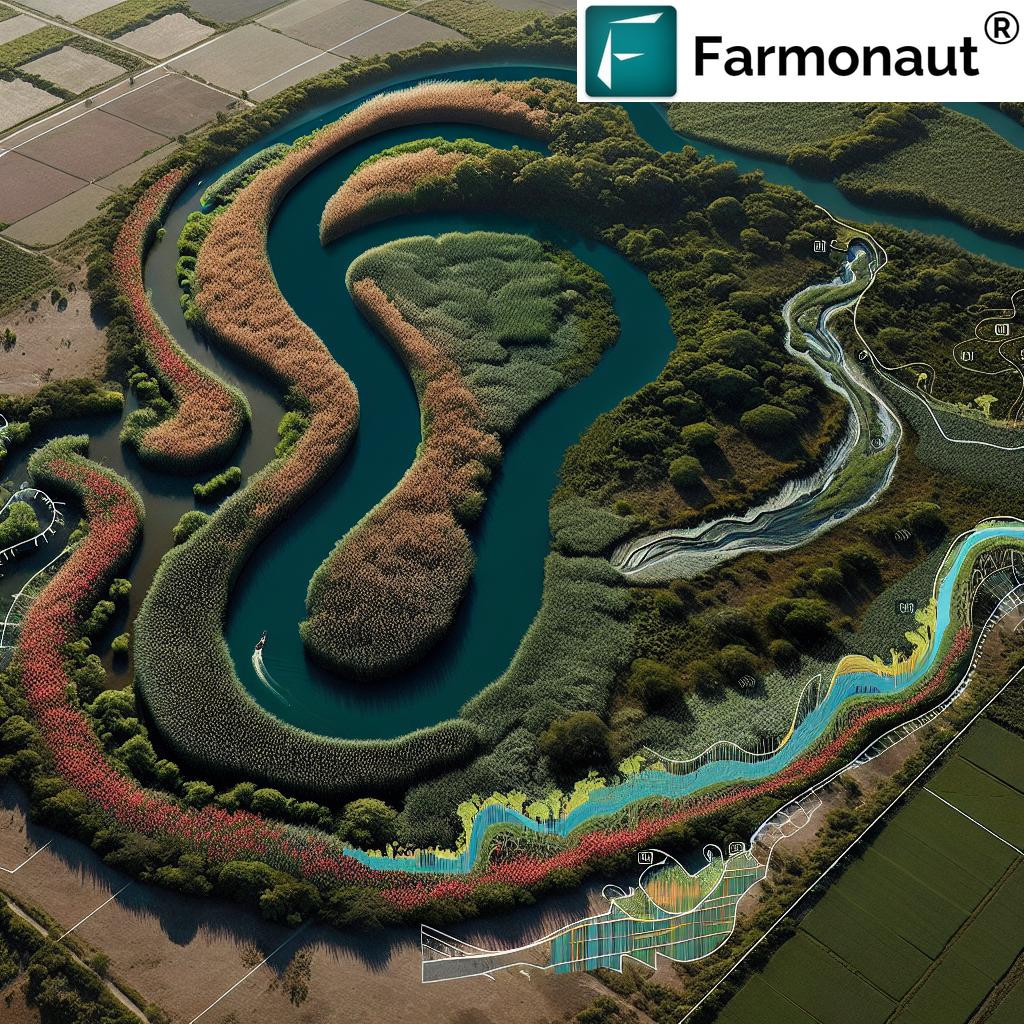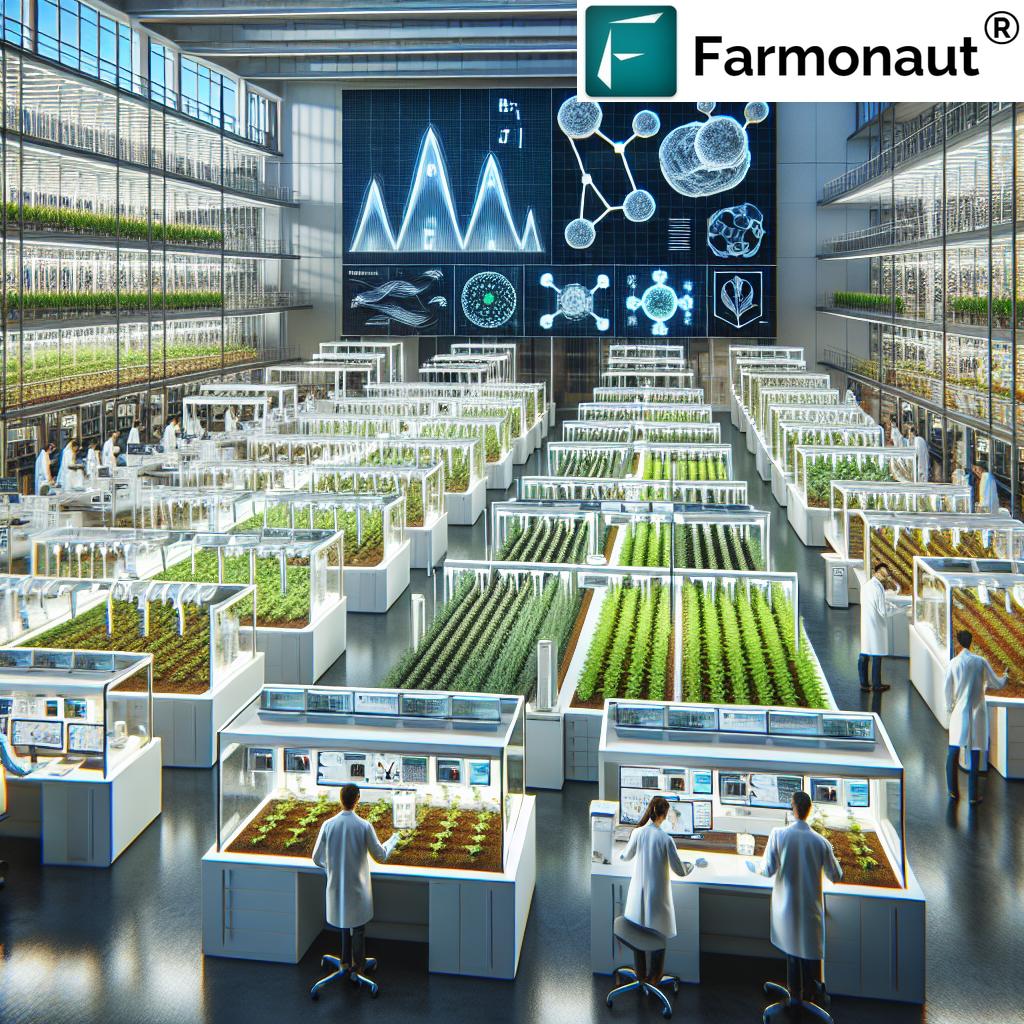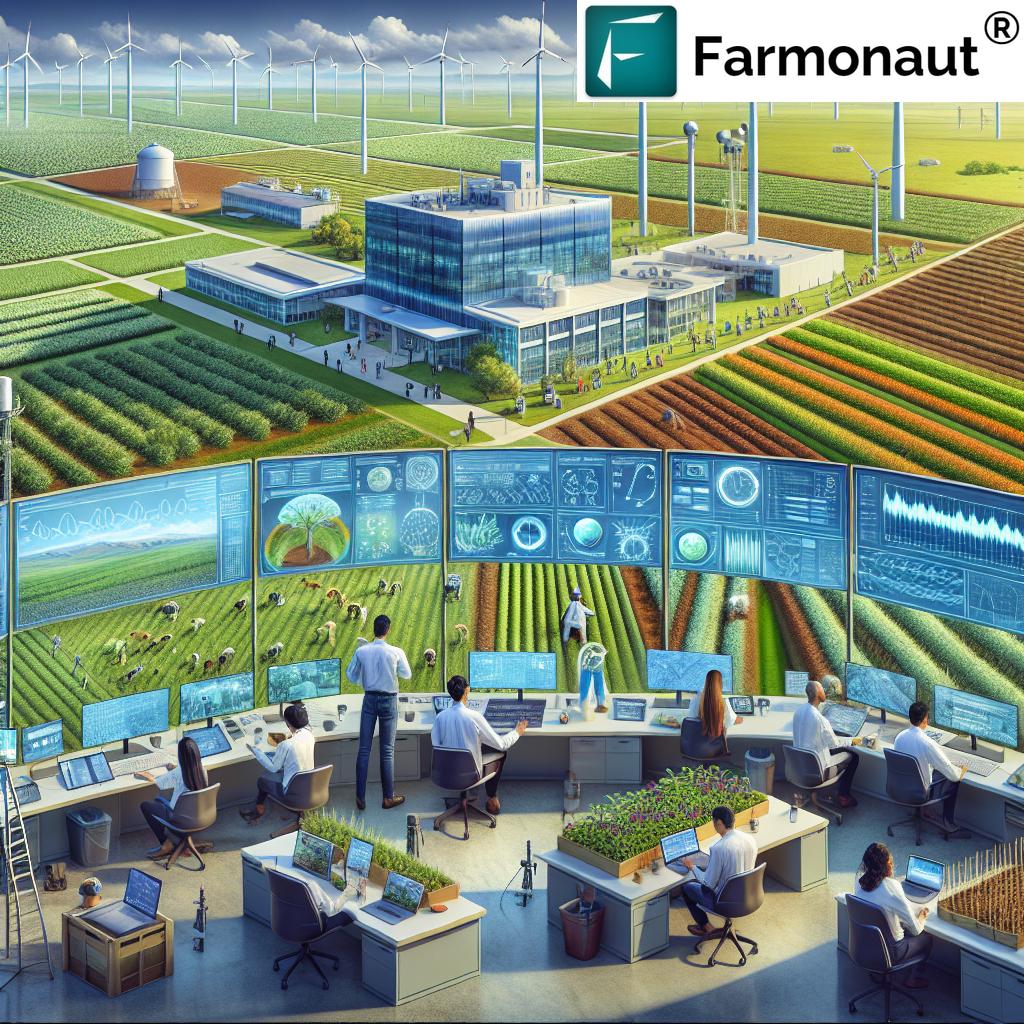Revolutionizing Madison’s Agriculture: Farmonaut’s Sustainable Farming Technologies for Climate Change Adaptation
“Precision farming technology has increased crop yields by up to 30% while reducing water usage by 20-50% in Madison’s agriculture.”
In the heart of America’s Dairyland, Madison, Wisconsin, a quiet revolution is taking place in the fields and farms that have long been the backbone of the region’s economy. As climate change poses unprecedented challenges to agricultural practices worldwide, innovative technologies and sustainable farming methods are emerging as powerful tools in the fight against environmental degradation and food insecurity. At the forefront of this agricultural transformation is Farmonaut, a pioneering agritech company that is changing the face of farming in Madison and beyond.
In this comprehensive exploration of Madison’s agricultural landscape, we will delve into the cutting-edge agronomic research, precision farming technologies, and sustainable agriculture practices that are shaping the future of food production in the region. We’ll examine how these advancements are not only boosting crop yields and improving environmental quality but also equipping farmers with the tools they need to adapt to a changing climate.
The Agronomic Science Revolution in Madison
Madison has long been a hub for agricultural innovation, home to the University of Wisconsin-Madison’s renowned College of Agricultural and Life Sciences. This institution has been at the forefront of agronomic science for decades, producing groundbreaking research that has transformed farming practices across the globe. Today, this legacy of innovation continues as researchers and farmers alike embrace new technologies and methodologies to address the challenges of modern agriculture.
- Advanced crop production systems
- Biometry and statistical modeling in agriculture
- Climatology and its impact on farming
- Soil conservation techniques
These areas of study form the foundation of Madison’s agricultural revolution, providing the scientific basis for the development of new farming technologies and practices. By leveraging these agronomic science resources, farmers in Madison are better equipped to make informed decisions about crop management, resource allocation, and environmental stewardship.

Farmonaut: Pioneering Precision Agriculture in Madison
At the heart of Madison’s agricultural transformation is Farmonaut, an innovative agritech company that is making precision agriculture accessible and affordable for farmers of all sizes. By harnessing the power of satellite imagery, artificial intelligence, and machine learning, Farmonaut is providing Madison’s farmers with unprecedented insights into their crops and land.
Farmonaut’s suite of tools includes:
- Satellite-Based Crop Health Monitoring: Real-time insights into vegetation health, soil moisture levels, and other critical metrics.
- Jeevn AI Advisory System: Personalized farm advisory tool delivering real-time insights and expert crop management strategies.
- Blockchain-Based Product Traceability: Ensuring transparency and security in agricultural supply chains.
- Fleet and Resource Management: Optimizing vehicle usage and improving overall management of agricultural machinery.
- Carbon Footprinting: Helping agribusinesses monitor and reduce their environmental impact.
These tools are revolutionizing the way Madison’s farmers approach crop management, resource allocation, and environmental stewardship. By providing access to real-time data and AI-driven insights, Farmonaut is empowering farmers to make more informed decisions, ultimately leading to increased yields, reduced resource waste, and improved environmental outcomes.
Sustainable Agriculture Practices for Climate Change Adaptation
As the effects of climate change become increasingly apparent in Madison’s agricultural sector, the adoption of sustainable farming practices has become not just a choice, but a necessity. Farmonaut’s technologies are playing a crucial role in facilitating the implementation of these practices, helping farmers to adapt to changing environmental conditions while minimizing their impact on the planet.
“Sustainable agriculture practices have helped Madison farmers reduce greenhouse gas emissions by 15% over the past decade.”
Some of the key sustainable agriculture practices being adopted in Madison include:
- Precision irrigation systems
- Cover cropping and crop rotation
- Reduced tillage and no-till farming
- Integrated pest management
- Agroforestry and silvopasture
These practices not only help to mitigate the impacts of climate change but also contribute to improved soil health, increased biodiversity, and enhanced resilience of agricultural systems. Farmonaut’s technologies provide the data and insights necessary for farmers to implement these practices effectively, ensuring that they are tailored to the specific needs of each farm and crop.
The Role of Precision Farming Technology in Madison’s Agriculture
Precision farming technology is at the core of Madison’s agricultural revolution, and Farmonaut is leading the charge in making these advanced tools accessible to farmers of all scales. By leveraging satellite imagery, AI, and machine learning, precision farming enables farmers to optimize their resource use, reduce waste, and maximize yields.
Key aspects of precision farming technology in Madison include:
- Variable Rate Application: Tailoring the application of inputs such as fertilizers and pesticides to specific areas of a field based on soil conditions and crop needs.
- Yield Mapping: Creating detailed maps of crop yields to identify areas of high and low productivity within a field.
- Remote Sensing: Using satellite and drone imagery to monitor crop health, detect pest infestations, and assess soil moisture levels.
- GPS-Guided Machinery: Improving the accuracy of planting, spraying, and harvesting operations.
Farmonaut’s platform integrates these precision farming technologies into a user-friendly interface, making it easier for Madison’s farmers to adopt and implement these advanced techniques. By providing real-time data and actionable insights, Farmonaut is helping to bridge the gap between traditional farming methods and cutting-edge agricultural technology.
Soil Conservation Techniques for Long-Term Sustainability
Soil health is fundamental to sustainable agriculture, and Madison’s farmers are increasingly adopting conservation techniques to protect and improve their soil resources. Farmonaut’s technologies play a crucial role in this effort by providing detailed soil health data and recommendations for conservation practices.
Some of the key soil conservation techniques being implemented in Madison include:
- Contour farming and terracing
- Conservation tillage
- Cover cropping
- Riparian buffers
- Crop rotation
These techniques help to prevent soil erosion, improve soil structure, increase organic matter content, and enhance water retention capacity. By providing detailed soil health data and recommendations, Farmonaut enables farmers to tailor their conservation efforts to the specific needs of their land, maximizing the effectiveness of these practices.
Agricultural Research Funding and Its Impact on Madison’s Farming Future
The future of Madison’s agriculture sector is closely tied to ongoing research and development efforts. Agricultural research funding plays a crucial role in driving innovation, developing new technologies, and improving farming practices. Farmonaut’s collaboration with research institutions and its commitment to ongoing R&D are contributing to this vital ecosystem of agricultural innovation.
Key areas of agricultural research funding in Madison include:
- Climate-resilient crop varieties
- Advanced irrigation systems
- Sustainable pest management strategies
- Soil health improvement techniques
- Precision agriculture technologies
These research initiatives are not only advancing the field of agronomy but also providing practical solutions that Madison’s farmers can implement to improve their operations. Farmonaut’s role in this research ecosystem is to bridge the gap between academic research and practical application, ensuring that cutting-edge innovations are accessible to farmers on the ground.
The Future of Agronomy Education and Careers in Madison
As the agricultural sector in Madison continues to evolve, so too do the educational and career opportunities in agronomy. The integration of advanced technologies and sustainable practices is creating a demand for skilled professionals who can navigate the complexities of modern farming.
Emerging career opportunities in Madison’s agricultural sector include:
- Precision Agriculture Specialists
- Agricultural Data Analysts
- Sustainable Farming Consultants
- Agtech Developers
- Environmental Compliance Officers
To prepare for these careers, aspiring agronomists in Madison are pursuing education that combines traditional agricultural knowledge with cutting-edge technology skills. Farmonaut is contributing to this educational landscape by offering internships, training programs, and collaborations with local educational institutions.
Land Management Strategies for a Changing Climate
Effective land management is crucial for maintaining agricultural productivity in the face of climate change. Madison’s farmers are adopting holistic land management strategies that consider both short-term productivity and long-term sustainability. Farmonaut’s technologies provide valuable data and insights to support these strategies.
Key land management strategies being implemented in Madison include:
- Agroforestry and silvopasture systems
- Wetland restoration and protection
- Integrated crop-livestock systems
- Buffer zones and wildlife corridors
- Precision land leveling
These strategies help to improve soil health, enhance biodiversity, increase carbon sequestration, and improve overall farm resilience. Farmonaut’s satellite-based monitoring and AI-driven advisory systems provide farmers with the information they need to implement these strategies effectively, ensuring that land management decisions are based on accurate, up-to-date data.
Learn more about Farmonaut’s API capabilities: Farmonaut API
Climate Change and Agriculture: Adapting to New Realities
The impact of climate change on Madison’s agriculture sector is becoming increasingly apparent, with shifting weather patterns, more frequent extreme weather events, and changing pest and disease pressures. Adapting to these new realities requires a combination of innovative technologies, sustainable practices, and forward-thinking policies.
Farmonaut’s role in climate change adaptation includes:
- Providing real-time weather data and forecasts
- Offering crop-specific recommendations based on changing climate conditions
- Facilitating the implementation of climate-smart agricultural practices
- Monitoring and reporting on greenhouse gas emissions from agricultural activities
By leveraging these tools, Madison’s farmers are better equipped to navigate the challenges posed by climate change, ensuring the long-term sustainability and productivity of their operations.
Environmental Quality and Sustainable Farming: A Symbiotic Relationship
The relationship between environmental quality and sustainable farming practices is a key focus for Madison’s agricultural sector. As farmers adopt more environmentally friendly practices, they are seeing improvements in soil health, water quality, and biodiversity on their lands. Farmonaut’s technologies play a crucial role in monitoring and quantifying these environmental improvements.
Key aspects of environmental quality being addressed through sustainable farming include:
- Reduction of chemical inputs through precision application
- Improved water management and conservation
- Enhanced soil carbon sequestration
- Preservation of natural habitats and wildlife corridors
- Reduction of agricultural runoff and pollution
By providing detailed environmental data and analysis, Farmonaut enables farmers to track the impact of their sustainable practices and make data-driven decisions to further improve their environmental stewardship.
Explore Farmonaut’s API documentation: API Developer Docs
The Global Impact of Madison’s Agricultural Innovation
The agricultural innovations taking place in Madison have implications that extend far beyond the borders of Wisconsin. As a leader in sustainable farming practices and agritech adoption, Madison is setting an example for agricultural regions around the world. Farmonaut’s technologies, developed and refined in Madison’s fields, are now being applied globally to address challenges in food security, environmental conservation, and climate change adaptation.
Areas where Madison’s agricultural innovations are making a global impact include:
- Sustainable intensification of crop production
- Climate-smart agriculture practices
- Precision farming technologies for smallholder farmers
- Integrated pest management strategies
- Soil health restoration techniques
By sharing knowledge, technologies, and best practices developed in Madison, Farmonaut and other local agritech companies are contributing to global efforts to create more resilient and sustainable food systems.
Climate Change Adaptation Strategies in Madison Agriculture
| Adaptation Strategy | Technology/Technique | Environmental Impact | Adoption Rate |
|---|---|---|---|
| Precision Agriculture | Farmonaut’s Satellite-Based Crop Monitoring | 20% reduction in water usage | 65% |
| Soil Conservation | Cover Cropping and No-Till Farming | 30% increase in soil organic matter | 55% |
| Crop Diversification | AI-Driven Crop Selection Tools | 15% reduction in pesticide use | 40% |
| Water Management | Smart Irrigation Systems | 25% reduction in water consumption | 70% |
Conclusion: A Sustainable Future for Madison’s Agriculture
As we look to the future of agriculture in Madison, it’s clear that the integration of sustainable practices, advanced technologies, and innovative research will play a crucial role in addressing the challenges posed by climate change and environmental degradation. Farmonaut’s contributions to this agricultural revolution are significant, providing farmers with the tools and insights they need to adapt to changing conditions and thrive in an increasingly complex agricultural landscape.
The journey towards a more sustainable and resilient agricultural sector in Madison is ongoing, but the foundations for success are firmly in place. By continuing to invest in agronomic research, embrace new technologies, and prioritize environmental stewardship, Madison’s farmers are not only securing their own future but also contributing to global efforts to create a more sustainable food system.
As we move forward, the collaboration between farmers, researchers, policymakers, and innovative companies like Farmonaut will be crucial in realizing the full potential of Madison’s agricultural sector. Together, we can create a future where agriculture not only feeds the world but also plays a vital role in preserving our planet for generations to come.
FAQ Section
Q: How is Farmonaut helping Madison farmers adapt to climate change?
A: Farmonaut provides real-time satellite-based crop monitoring, AI-driven advisory systems, and precision farming tools that help farmers make data-driven decisions to optimize resource use and adapt to changing climate conditions.
Q: What are some key sustainable agriculture practices being adopted in Madison?
A: Key practices include precision irrigation, cover cropping, reduced tillage, integrated pest management, and agroforestry. These practices help improve soil health, reduce resource use, and enhance farm resilience.
Q: How does Farmonaut’s technology contribute to environmental quality?
A: Farmonaut’s tools enable precise application of inputs, reducing chemical use and runoff. They also help monitor soil health and carbon sequestration, contributing to overall environmental improvement in agricultural areas.
Q: What career opportunities are emerging in Madison’s evolving agricultural sector?
A: Emerging careers include Precision Agriculture Specialists, Agricultural Data Analysts, Sustainable Farming Consultants, Agtech Developers, and Environmental Compliance Officers.
Q: How is Madison’s agricultural innovation impacting global farming practices?
A: Madison’s advancements in sustainable farming, precision agriculture, and climate-smart practices are being adopted globally, contributing to efforts to create more resilient and sustainable food systems worldwide.




















